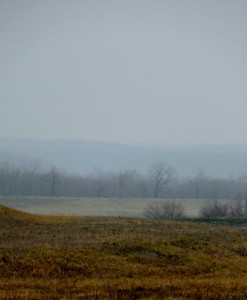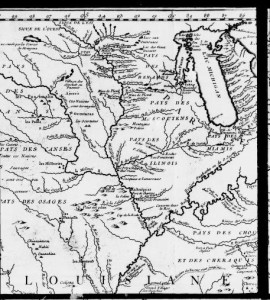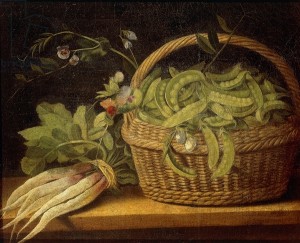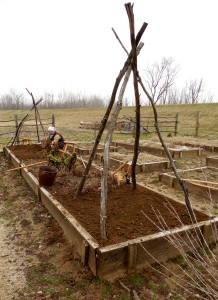dimanche 1 février 2015
41°F, Cloudy
11 mph, WNW
As the winter days march onward and Le Fete des Roi, the Feast of the King-Twelfth Night is now past, Mardi Gras hovers on the doorstep, soon to herald the start of the Lenten season. With its approach, can the traditional renewal of Easter, both spiritual and seasonal, be far behind? The lack of snow in the Illinois country gives hope and a promise of spring. But the new season seems suspended in the future just beyond one’s grasp, swinging between the rise and fall of the temperatures. It seems to be in our nature to believe the seasonal vagaries of the elements are exceptional and unique to our time and place, but it is interesting to read an early account from a Jesuit explorer and historian remarking upon the unpredictable winter weather in the Illinois country:
“It is true, it was quite otherwise at Kaskasquias some days ago, when I left it; but I have since learned on my way hither, that the river was at first frozen over in such a manner that people crossed it in carriages, not with-standing it is at that place half a league broad, and more rapid than the Rhone. This is the more surprising, as for the most part, excepting a few slight frosts occasioned by the north and north-west winds, the winter is in this country hardly sensible. The river has not been frozen wherever I have been, but as I was obliged to remain all the day in an open boat, and consequently, was exposed to all the injuries of the weather, and had taken no pre-cautions against a cold I did not foresee, I have suffered very great hardships.”
Pierre Francois Xavier de Charlevoix, Journal of a Voyage to North America, 1721.
While reconciling ourselves to the cold as it lingers, a slow hum of excitement builds with the lengthening of light-filled hours each day. The temperature and precipitation might prevent active work in the garden, so time is now well spent sharpening tools, starting seeds, and planning the jardin potager bed layouts. Later this month the serious work in the garden begins, pruning fruit trees, turning and amending the soil in the raised beds, and planting the seeds of late winter crops. Mid to late February is the appropriate time to sow cold-tolerant seeds of spinach, cabbage, leeks, kale, and peas. Effort and care are taken to grow vegetables in the jardin potager that mimic the types and varieties that could have been sown by the eighteenth-century French habitants. Firsthand accounts of the travelers in French communities of North America remarked on the general types of vegetables grown and this garden endeavors to follow and reflect those narratives. Where eighteenth-century heirloom types no longer exist, the effort is made to grow more recent heirlooms that reflect the look and taste of produce grown during that era. These late winter varietal seed names themselves intrigue the imagination: Glory of Enkhuizen cabbage, Cavolo Nero kale, Blue-Podded Capucijner peas, Long Scarlet radish, and Monstrueux de Viroflay spinach.
The 5th annual Fort de Chartres Jardin Potager Weekend to be held February 28 and March 1st will be spent accomplishing garden tasks as a few habitants recreate the experiences of the colonists of the eighteenth-century Illinois country, readying a French colonial kitchen garden for spring. You are welcome to visit both Saturday and Sunday, from 11 AM to 3 PM and on Sunday, March 1, at 1:30 PM, meet in the Fort store building for a special discussion about French Colonial gardening in the mid-eighteenth century and information will be shared concerning the direct sowing of seed. Throughout the weekend, work will begin in the garden preparing beds and planting seeds appropriate for late winter. Heirloom seed packet samples and informational flyers will be available for those joining us to celebrate the new gardening season ahead. This event is free and open to the public. For more information call (618) 274-7230. Salut le jardin février!




Leave a Reply